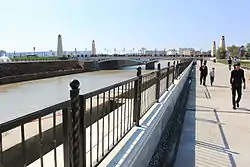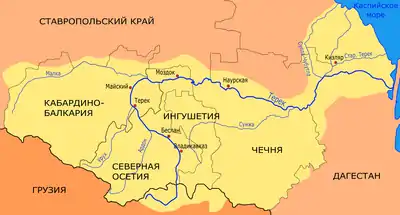Sunzha (river)
The Sunzha (Russian: Су́нжа, IPA: [ˈsunʐə], Ingush: Шолжа, Sholʒə, Chechen: Соьлжа, Sölƶa[1]) is a river in North Ossetia, Ingushetia and Chechnya, Russia, a tributary of the Terek. It flows northeast inside the great northwest bend of the Terek River and catches most of the rivers that flow north from the mountains before they reach the Terek. It is 278 kilometres (173 mi) long, and has a drainage basin of 12,000 square kilometres (4,600 sq mi).[2] The Sunzha rises on the Northern slope of the Caucasus Major. Its major tributaries are the Assa and Argun. With a turbidity of 3,800 grams per cubic metre (6.4 lb/cu yd), it carries 12.2 million tons of alluvium per year. It is used for irrigation. Cities that lie on the Sunzha include Nazran, Karabulak, Grozny (the capital of Chechnya), and Gudermes. During the First and Second Chechen Wars, the destruction of petroleum reservoirs caused the Sunzha to become polluted with petroleum.[3]
| Sunzha | |
|---|---|
 The Sunzha in Grozny | |
| Location | |
| Country | North Ossetia, Ingushetia and Chechnya, Russia |
| Physical characteristics | |
| Source | |
| • location | Greater Caucasus, North Ossetia |
| Mouth | Terek |
• coordinates | 43°26′27″N 46°08′05″E |
| Length | 278 km (173 mi) |
| Basin size | 12,000 km2 (4,600 sq mi) |
| Basin features | |
| Progression | Terek→ Caspian Sea |

Nomenclature
The origin of the name of the river is disputed. The most probable of versions name Sunzha has come from Mongol-Turkic languages in the deformed type. It is known, that Mongols called it Suinchie, Russian Sevenz and in the Chechen language it is names has got in corrective type Solchzha.
There is also other version that the river Sunzha Chechens called before Okhi «Oh'-hi, Оhhи » that means in translation with Chechen – «downwards the river». The Sunzha ( Sundscha) River was reached by The Abwehr, 1933–1943, together with rivers in the Caucasus. The Sunzha was penetrated in part by The Abwehr and the German Armies, 1942–3.
See also
- Valerik (river) – historically notable tributary of Sunzha
References
- Lepiev A.S., Lepiev İ.A., Türkçe-Çeçençe sözlük, Turkoyŋ-noxçiyŋ doşam, Ankara, 2003
- Река Сунжа in the State Water Register of Russia (Russian)
- John Daniszewski (March 11, 2001). "Chechens Find a Way to Live Off the Land--Through Oil". Los Angeles Times. Archived from the original on May 24, 2001. Retrieved September 28, 2007.